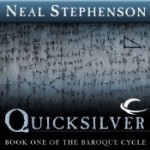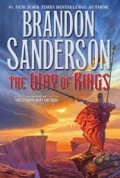
 Mr. Penumbra’s 24-Hour Bookstore
Mr. Penumbra’s 24-Hour Bookstore
By Robin Sloan; Read by Ari Fliakos
Audible Download – 7 Hours 41 Minutes [UNABRIDGED]
Publisher: Macmillan Audio
Published: 2012
Themes: / mystery / technology / cerebral / singularity / metafiction
Every once in a blue moon, a completely off-the-radar book comes zooming in out of left field and smacks you upside the head. I love books about books and bookstores and bibliophiles, so even reading the title was like swallowing a long, curved, gleaming fishhook. The tagline yanked the hook up into my soft palate and began reeling me in:
A gleeful and exhilarating tale of global conspiracy, complex code-breaking, high-tech data visualization, young love, rollicking adventure, and the secret to eternal life – mostly set in a hole-in-the-wall San Francisco bookstore.
The story is told from the perspective of down-on-the-heel design school graduate Clay Jannon, who lands a graveyard shift gig at the titular bookstore. Mr. Penumbra is an archetypically mysterious bookstore. Jannon soon discovers that the bookstore is merely a front for a lending library catering to a strange cult-like group of readers. Unable to contain his curiosity despite warnings from the proprietor, Clay investigates, aided in his quest by his artistic roommate, his Silicon Valley love interest, and a host of other quirky and likeable characters.
I know what you’re thinking: mysterious books, ancient cults, and a quest for eternal life–sounds like a Dan Brown novel. Not so! Where Brown’s prose is ponderous, even pompous, Sloan’s writing is equal parts wit and vigor. It often reads like early Neal Stephenson or, at its best, a timeless Neil Gaiman. Many superficial elements bear a resemblance to Brown’s work, but in the end this is a Brownian novel for true geeks. Brown’s wild, far-fetched car chases through Paris streets are replaced by equally far-fetched but far more satisfying night-time raids into a secret library with a DIY book scanner and an epic set piece data visualization scrum which takes place at Google headquarters. The novel explores areas as esoteric and diverse as typography, cloud computing, and archaeology. The real engine driving most modern mystery thrillers is action, but ideas fuel Mr. Penumbra.
Even readers like me who prefer fantasy to future tales will find something to like here, since the bibliographic mystery ultimately hinges on a trilogy of fictitious epic fantasy novels, The Dragon Song Chronicles. To say more would spoil the plot, but suffice it to say that even the most die-hard D&D player wouldn’t put down the book wholly disappointed. In one scene, the protagonist obtains a recording of the trilogy read by the author on cassette tape, and, in a nice touch that mirrors the novel’s preoccupation with metafiction, Macmillan Audio renders those particular passages in scfratchy, low-quality audio read by a narrator who stepped right out of the 1980s.
And speaking of narration, Ari Fliakos does a fine job with Mr. Penumbra. The novel is rife with obscure terminology drawing from a diverse wealth of linguistic sources, yet Fliakos makes few if any slips. His youthfully exuberent Clay and his tremulously throaty Mr. Penumbra fit the characters perfectly, as do the voices he selects for most of the other characters. A part of me wishes that Jonathan Davis had narrated this novel, since it then would have felt almost like a more upbeat Snow Crash. But that’s only wishful thinking on my part and not at all fair to Mr. Fliakos. A bad performance could have ruined this otherwise outstanding novel, but his performance does it justice.
The book isn’t perfect. The plot, while engaging, is fairly predictable and formulaic at times. I often found myself easily predicting the next twist. As so often happens in these novels, the romance didn’t quite come off as natural to me, although one could make a strong argument that Sloan intentionally made the love interest ambiguous. These are minor quibbles, however. If anything in this review strikes you as remotely interesting, you should read this book. You won’t regret it.
Posted by Seth






